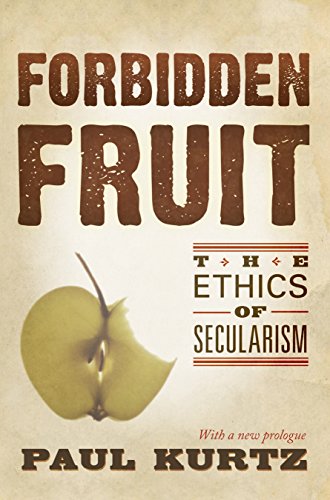Articles liés à Forbidden Fruit: The Ethics of Secularism

L'édition de cet ISBN n'est malheureusement plus disponible.
Afficher les exemplaires de cette édition ISBNLes informations fournies dans la section « Synopsis » peuvent faire référence à une autre édition de ce titre.
Fundamentalists deny the possibility of ethics without belief in God. Conservatives rail against secularists. Yet belief in God is no guarantee of moral virtue - as the evils committed in the name of religion have vividly shown. Are there secular ethical principles and values that are vital for a world in crisis?
In this new edition of Forbidden Fruit, Kurtz defends the ethics of secularism and humanism. In order to progress to a maximum level of creative development, he maintains that we must be nourished by the "forbidden fruit" of the knowledge of good and evil, grounding principles and values in autonomous reason. This is the path that leads to the discovery of significant ethical truths that can guide both self-reliant conduct and consideration for the rights of others. By breaking the bonds of theistic illusion, we can summon the courage and wisdom to develop a rational ethic based on a realistic appraisal of nature and an awareness of the centrality of the moral decencies common to all peoples.
The ultimate key to the good life, Kurtz writes, is to eat of the fruit of the second tree in the Garden of Eden - the tree of life - discovering for ourselves the manifold potentialities for a bountiful existance.
Forbidden Fruit contains important chapters on ethical excellences for individuals, moral education for children, and thoughts on privacy and human rights, in addition to presenting concrete ethical recommendations as alternatives to the reigning orthodoxies.
Les informations fournies dans la section « A propos du livre » peuvent faire référence à une autre édition de ce titre.
- ÉditeurPrometheus Books
- Date d'édition2008
- ISBN 10 1591026660
- ISBN 13 9781591026662
- ReliureBroché
- Nombre de pages326
- Evaluation vendeur
Acheter neuf
En savoir plus sur cette édition
Frais de port :
Gratuit
Vers Etats-Unis
Meilleurs résultats de recherche sur AbeBooks
Forbidden Fruit: The Ethics of Secularism
Description du livre Softcover. Etat : New. Paul Kurtz, America's leading secular humanist philosopher, affirms that it is possible to live the good life and be morally responsible, without belief in religion. In this original and penetrating book, Kurtz delineates the means by which humanity can transcend the limitations of traditional religious loyalties and achieve a higher stage of ethics.Fundamentalists deny the possibility ofethics without belief in God. Conservatives rail against secularists. Yet belief in God is no guarantee of moral virtue - as the evils committed in the name of religion have vividly shown. Are there secularethical principles and values that are vital for a world in crisis?In this new edition ofForbidden Fruit, Kurtz defends the ethics of secularism and humanism. In order to progress to a maximum level of creative development, he maintains that we must be nourished by the "forbidden fruit" of the knowledge of good and evil, grounding principles and values in autonomous reason. This is the path that leads to the discovery of significant ethical truths that can guide both self-reliant conduct and consideration for the rights of others. By breaking the bonds of theistic illusion, we can summon the courage and wisdom to develop a rational ethic based on a realistic appraisal of nature and an awareness of the centrality of the moral decencies common to all peoples.The ultimate key to the good life, Kurtz writes, is to eat of the fruit of the second tree in the Garden of Eden - the tree of life - discovering for ourselves the manifold potentialities for a bountiful existance.Forbidden Fruitcontains important chapters on ethical excellences for individuals, moral education for children, and thoughts on privacy and human rights,in addition to presenting concrete ethical recommendations as alternatives to the reigning orthodoxies. N° de réf. du vendeur DADAX1591026660
Forbidden fruit the ethics of secularism
Description du livre TAPA BLANDA. Etat : New. N° de réf. du vendeur 100837214

